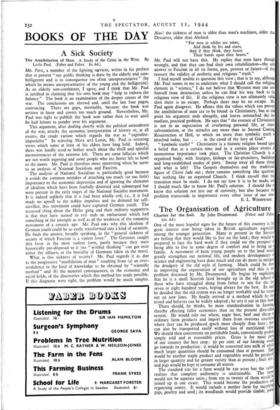BOOKS OF THE DAY
A Sick Society
The Annihilation of Man. A Study of the Crisis in the West. By Leslie Paul. (Faber and Faber. 8s. 6d.)
MR. PAUL, a member of the fighting sarvices, writes in his preface that at present "our public thinking is done by the elderly and non- belligerent and is in consequence too often unrepresentative" (by which he means unrepresentative of the young and the belligerent).
As an elderly non-combatant, I agree, and I think that Mr. Paul is justified in claiming that his own book may "help to redress the balance." The book is an examination of the deeper causes of the war. The conclusions are shrewd and, until the last four pages, convincing. There are gaps, inevitably, because the book was written in haste and covers too much ground. Nevertheless, Mr. Paul was right to publish the book now rather than to wait until he had leisure to ponder over his argument.
This argument, after dealing shortly with the political antecedents of the war, attacks the economic interpretation of history or, at all events, the crude variant which regards the war as " capitalist- imperialist " In rejecting Marx and Lenin, Mr. Paul is restating views which some at least of his elders have long held. Indeed, there was hardly need to bother much about the shrill and spiteful inconsistencies of the extreme left. There are some fallacies which are not worth exposing and some people who are better left to howl to the moon. Mr. Paul is therefore mote interesting when he turns to an analysis of National Socialism and Fascism.
The analysis of National Socialism is particularly good because it avoids the common mistakes of attaching too much (or too little) importance to the economic depression and of ignoring the elements of idealism which have been fearfully distorted and submerged but were present in the early stages of the National Socialist movement. It is indeed unlikely that if it had been wholly evil, i.e., if it had made no appell to the nobler impulses and no demand for self- sacrifice, this movement could have captured German youth. The accursed thing about the Hitler gang and their military supporters is that they have turned to evil ends an enthusiasm which had something of the strength as well as all the weakness of the romantic movement of a century ago. Mr. Paul asks why this idealism of German youth could be so easily transformed into a kind of satanism. He finds the answer, broadly speaking, in the "general sickness of society of which Fascism is a violent fever." The Germans caught this fever in the most violent form, partly because they were historically pre-disposed to it (no "wishful thinking" can get over either the silliness or the brutality of Germans taken in the mass).
What is this sickness of society? Mr. Paul regards it as due to the progressive "annihilation of man" resulting from (a) an over- confidence in the kind of knowledge to be obtained by "scientific method" and (b) the material consequences, in the economic and social fields, of the discoveries which this method has made possible. If this diagnosis were right, the problem would be much simpler.
Alas! the sickness of man is older than man's machines, older that, Descartes, older than Abelard.
" For men at whiles are sober, And think by fits and starts, And if they think, they fasten Their hands upon their hearts."
Mr. Paul will not have this. He replies that men have though wrongly, and that they can find their own rehabilitation—the only answer to Fascism in all its forms, past, present or future—if the reassert the validity of aesthetic and religious "truth."
I find myself unable to question this view ; that is to say, although Mr. Paul seems to me to underrate what I should call the religious element in "science," I do not believe _that Western man can save himself from destruction unless • he can find his way back to the religious view of life. If the religious view is not ultimately valid, then there is no escape. Perhaps there may be no escape. Mt Paul again disagrees. He affirms that the values which can prevent the annihilation of man are to be found in Christianity, but at this point his argument ends abruptly, and leaves untouched the in. mediate, practical problem. He says that " the essence of Christianity is not in an expectation of everlasting personal life, or trans. substantiation, or the miracles any more than in Second Coming Resurrection or Hell, to which no more than symbolic truth is attached today, but . . . in the creed of the love of God."
"Symbolic truth?" Christianity is a historic religion based upon a belief that at a certain time and in a certain place events ol
momentous importance took place. The Christian Church is an organised body, with liturgies, bishops or lay-preachers, buildings and long-established modes of piety. Sweep away all these things and what is left? The Gospels themselves and the traditional figure of Christ fade out ; there remains something like quietism, but nothing like an organised Church. I think myself that this transition must be made. I do not sce how it is to be made, and I should much like to know Mr. Paul's solution. I should like to know this solution not just out of curiosity, but also because the problem transcends in importance every other issue of our time
E. L. WoonwAno.


























 Previous page
Previous page